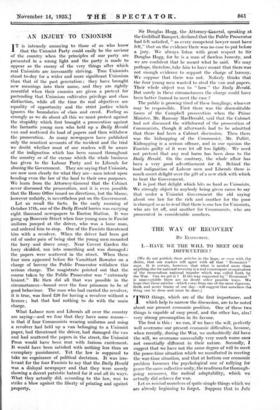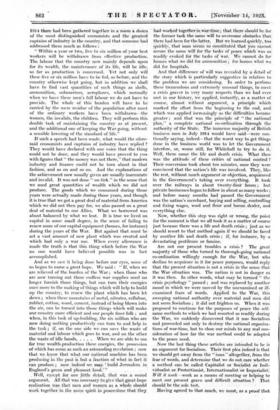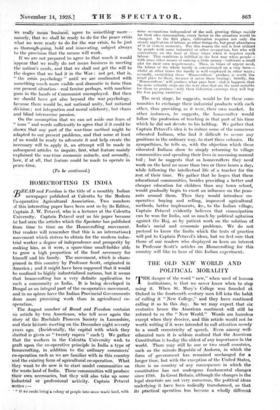I.—HAVE WE THE WILL TO MEET OUR DIF,FICULTIES ? -
[We do not publish these articles in the hope, or even with the desire, that our readers will agree with all that " Economist " says. it is certain, however, that what is needed more than anything else for national recovery is a real counterpart or equivalent of the tremendous national impulse which was called forth by the War. Can we get it ? if the way suggested by " Economist " is unacceptable there are no doubt other possible ways. We hope that these articles—which come from one of the most vigorous, fresh and acute brains of our day—will suggest that somehow the thing can be done and must be done.]
r 'IWO things, which are of the first importance, and 1 which help to narrow the discussion, are to be noted about our present economic position. One of these two. things is capable of easy proof, and the other has, alas very strong presumption in its favour.
The first is this : we can, if we have the will, perfectly Well overcome our present economic difficulties, because,' when receptly, during the War, we undoubtedly did have the *ill, we overcame successfully very much worse ones not essentially .different in their nature. Secondly, I suggest that we have not the same degree of will to meet the peace-time situation which we manifested in meeting the war-lime situation, and that at bottom our economic problem becomes the psychological one of rallying for peace the same collective unity, the readiness for thorough-- going measures, the radical adaptability, which we actually did achieve for war.
: Let-us remind ourselves of quite simple things which we are already beginning to forget. Suppose that in July 1914 there had been'gathered together in a4Ooin a dozen 'of; the most distinguished economists and the greatest _ captains of industry-in the country, and that someone had addressed them much 'as follows:' "Within a year or two, five to six million of your best workers will be withdrawn • from effective production. The labour that the country now mainly depends upon for its wealth, the maintenance of its life, will be idle, se far is production is concerned. Yet not only will these five or six million have to be fed, as before, and the country 'otherwise kept 'going, but in addition' we- shall have to find vast quantities of such things as shells, ammunition, submarines, aeroplanes, which normally when we have these men's full labour we do not have to provide. The whole of this burden will have to be carried by the mere residue of the population after Most of the ordinary workers have been withdrawn—the women, the invalids, the children. They will perform this double task of maintaining the country as at present, and the additional one of keeping the War going, without a sensible lowering of the standard of life."
If such a speech had been made, what would the afore- said economists and captains of industry, have replied ? They would have declared with one voice that the thing could not be done, and they would have proved to you with figures that" the money was not there," that modern industry and finance could not be torn about in that fashion, and so on. and so on. And the explanations of the achievement now usually given are usually, inaccurate and invalid. It was not done" on tick" in the sense that we used great quantities of wealth which we did not produce. The goods which we consumed -during those years were actually- made during those years, and though it is true that we got a great deal of material from America which we did not then pay for, we also passed on a great deal of material to our Allies. What we borrowed was about balanced by what we lent. It is true we lived- on capital in sonic small degree, in the sense of failing to renew some of our capital equipment (houses, for instance) during the years of the War. But against that must be set a vast amount of new plant which was created and which had only a war use. When every allowance is made the truth is that this thing which before the War no one would have believed possible was in fact accomplished.
And as we saw it being done before our eyes, sonic of us began to nurse a great hope. We said : "If, when we are relieved of the burden of the War ; when those who are now turning out these endless war supplies need no longer furnish those things, but can turn their energies once more to the making of things which will help to build up the country, to renew the plant which has been let down ; when these mountains of metal, nitrates, cellulose; rubber, cotton, wood, cement, instead of being blown into the -air, can be turned into those things which will make our country more efficient and our people finer folk ; and, when, in this task of up-building, the six million who are now doing nothing productively can turn to, and help in the task ; if, on the one side we- can save the waste of material and labour -which goes to war, and on the other the waste of idle hands, . . . When we are able to use for true wealth-production these energies, the possession of which has come as such an astounding revelation ; now that we. know -that what our national machine has been: producing in the past is but a fraction of:what_ in _fact. it: can produce ; now-, indeed we may `; build Jerusalem: _in: ]ngland's- green and pleasant' " . - Well except for one little detail, that was, sound argument. All that was necessaryto,give that grpathope realization. was- that men and women -as a. whole should work -together in the same spirit in peace-time that they. had wOrked together in war-time; that there should .be..for: the former task the -same Will to overcome obstacles that there. had been for the latter, But we learned quickly, too; . . . quickly, that Mari seems so constituted that you cannot. secure the same will- for the tasks of peace which was so' readily evoked for the tasks of war. We cannot do for' houses what we did for ammunition ; for homes what we did ,for hospitals.
And that difference of will was revealed by a detail of the story which is particularly suggestive in relation to' the problem we are considering. In order; to perform' these tremendous and; extremely unusual things, to meet - a crisis graver in very many respects than we had ever, met in our history, we applied, instantly, as a matter of course, almost without argument, a principle which, marked the effort from the beginning to the end, a-nd: which was applied increasingly as the difficulties became greater ; and that was the principle of " the . national plan," a -complete national co-ordination through the authority of the State. The immense majority of British' business men in July 1914 would have said—were con- tinually saying, indeed—that the worst way to get things done in the business world was to let the Goverinnent. interfere, or, worse still, for , Whitehall to try to do it. Well, there came the life. and -death crisii. What then was the attitude of these critics of national control ? Their conversion took about ten minutes, once they were convinced that the nation's life was involved. They, like, the rest, without much argument -or objection, acquiesced, in the Government's taking over ;everything. It took! over the railways in about twenty-four 'hours ; but private businesses began to follow in about as many weeks ;, and before many months had passed the Govermnent was the nation's merchant, buying and selling, controlling; and fixing wages, wool and flour and bacon, dealer, and . .! everything else..
Now, whether this step was right or wrong, the point for the, moment is that we all took it as a matter of course just because there was a life and death crisis ; just as we should resort to that method again if we should be faced' by another life and death crisis ; if, for, instance, by a. devastating pestilence or famine. .
Are not our present troubles a crisis ? The great majority of those who turned to thorough-going nationai! co-ordination willingly enough for the War, but who decline to acquiesce in it for peace purposes, would reply. that the present situation is not a crisis in the sense that the War situation was. The nation is _not in danger as. it was then.. In other words, what may be termed" the crisis psychology" passed ; and was replaced by another mood in which we were moved by the unexamined or ill: examined fears of words. Applied to the War, this sweeping national authority over material and men did not seem Socialism ; it did not frighten us. When it was proposed to continue for the purposes of peace the self- same methods to which we had resorted so readily during the War, We suddenly discovered that it was Socialism- and proceeded not only to destroy the national organiza- tions of war-time, but to close our, minds to any real con, sideration of how far the war method could be adapted to the peace need. .. . • - . Now the.-last thing these articles are intended to be is an argument for Socialism.; Their first plea indeed is that we should get away from the "isms" altogether, from the fear :of words, and determ- ine.that we do not care whether, a -method' can: be :called Capitalist or Socialist or Indi-, vidualist. or .Proteetionist, :Internationalist 'or Imperialist:. Will it work---work as a means of meeting or helping to' meet .our present grave and difficult. situation?: That! should be the sole test.
Having agreed to that much, we must-, as a proof that ,We really -mean ,-businesi, I agree to - something—more-- namely; that We shall be ready to dolor the peace crisis what we were ready to do for the war crisis, to be just as thorough-going, bold and innovating, subject always to the provision that the means will work. , If we are not prepared to agree to that much it would appear that we really do not mean business in meeting the nation's needs, and that we shall not get the will to the degree that we had it in the War : not get, that is, " the crisis psychology" until we are confronted with something much more visible and dramatic in form than our present situation—real famine perhaps, with machine 'wniris in the hands of Communist unemployed. But then we should have got also beyond the war psychology, because there would be, not national unity, but national division; not integration and moral solidarity, but chaos and blind internecine passion. On the assumption that we can set aside our fears of ," isms" and words sufficiently to agree that if it could be shown that any part of the war-time method might be 'adapted to our present problems, and that some at least of us would be ready to advocate it and help create the necessary will to apply it, an attempt will be made in subsequent articles to inquire, first, what feature mainly explained the war-time economic miracle, and secondly, if at all, that feature could be made to operate in peace-time.- (To be continued.)




























































 Previous page
Previous page